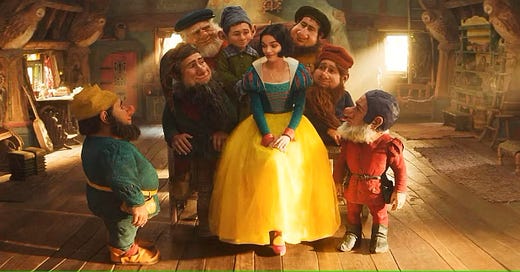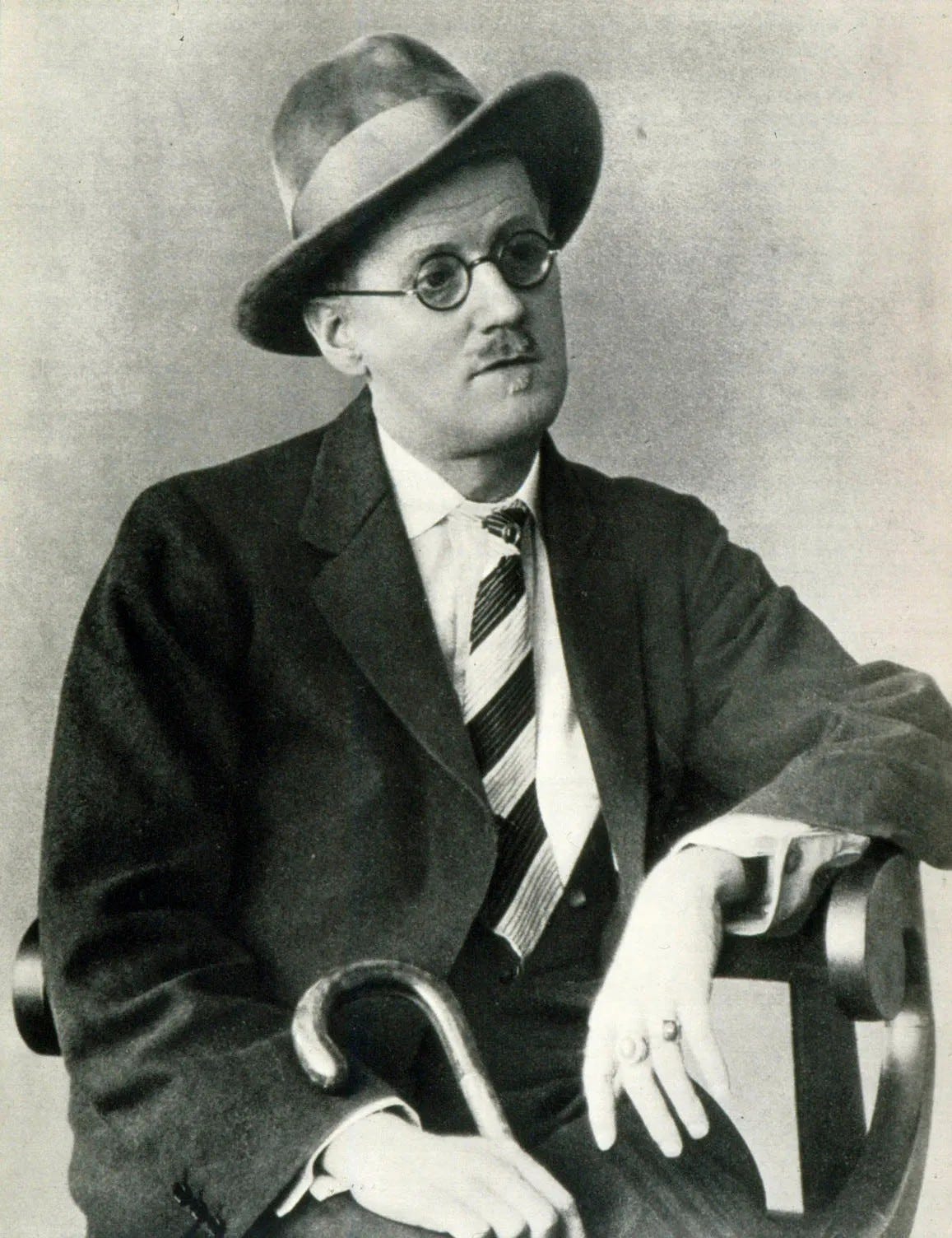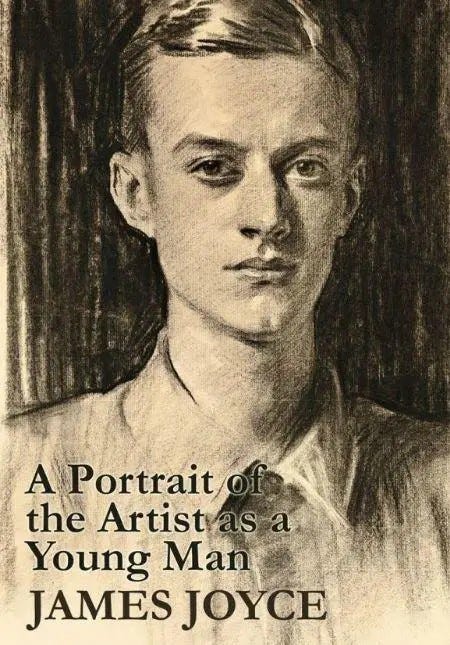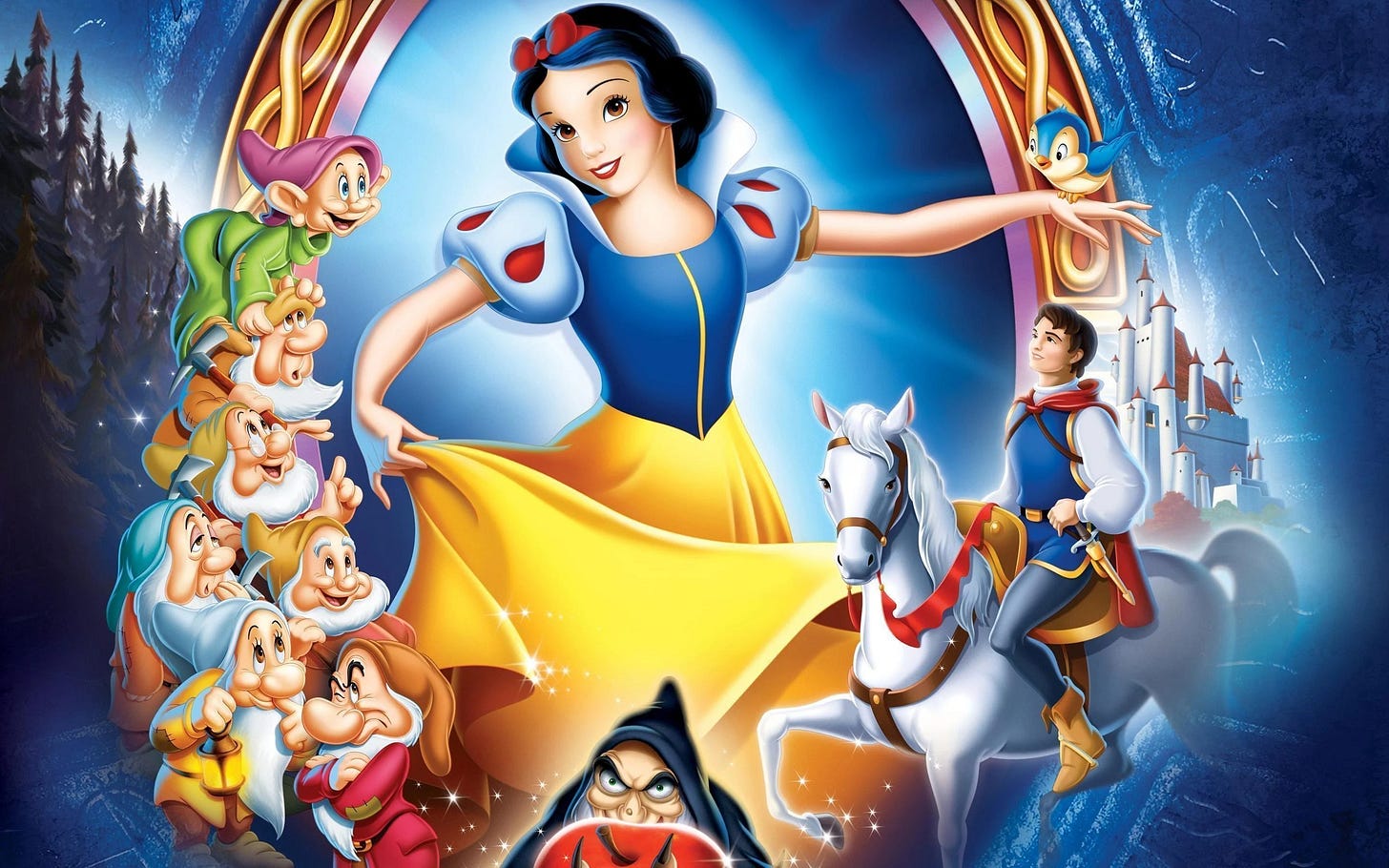Snow White’s Box Office Bomb: How Hollywood Shapes What We Believe
The Dangerous Power of Disney and Netflix, and the Terrible Damage of Unfaithful Woke Storytelling
“Mother is packing my new secondhand clothes. She prays now, she says, that I may learn in my own life and away from home and friends what the heart is and what it feels. Amen. So be it. Welcome, O life! I go to encounter for the millionth time the reality of experience and to forge in the smithy of my soul the uncreated conscious of my race.”
- James Joyce, Portrait of the Artist as a Young Man
Disney’s Snow White remake faced massive backlash and flopped at the box office due to controversial casting choices, a radical rewrite of the classic story, and public criticism from its lead actress.
Many saw it as another example of Hollywood prioritizing political messaging over storytelling, further alienating audiences.
The film's failure reflects a growing disconnect between the entertainment industry and moviegoers who crave authentic storytelling over ideological agendas.
Disney's 'Snow White' remake box office suffers a 66% drop in the second weekend of showings.
The film's flop, much thanks to Rachel Zegler, could end up costing Disney millions of dollars.
The movie is currently one of the lowest IMDb-rated movies of all time, receiving a 1.6 out of 10 rating.
It has generated $143.1 million globally to date, well short of the $250 million cost to produce the film, which does not include marketing expenses as reported by Variety.
The son of producer Marc Platt ripped Zegler for ruining his father's movie last week, accusing her of being the reason the film flopped:
"Tens of thousands of people worked on that film and she hijacked the conversation for her own immature desires at the risk of all the colleagues and crew and blue-collar workers who depend on that movie to be successful."
"Narcissism is not something to be coddled or encouraged."
What shapes the values and beliefs of a society more—its politics or its stories?
Who holds more power: the lawmakers or the artists, writers and storytellers who inspire the hearts and minds of the new generations?
Throughout history, art and storytelling have been the forge in which the soul of a nation is shaped.
James Joyce understood this when he wrote, “I go to forge in the smithy of my soul the uncreated conscience of my race.” Artists and writers have always wielded immense cultural power, influencing how people view themselves, their communities, and their morality.
But what happens when this power is misused?
Today, corporations like Disney, Netflix, and others have taken on the role of cultural smiths, but instead of inspiring greatness or uplifting society, they’ve chosen to advance divisive ideologies that undermine traditional values.
These companies are not just creating entertainment—they’re reshaping America’s conscience, and the consequences are dangerous.
James Joyce Understood the Power of the Writer
When I was in my late 30s, I discovered the works of James Joyce, and it changed the way I thought about literature and the power of language. I started with A Portrait of the Artist as a Young Man, and from the very first pages, I was captivated by the sheer beauty of his prose—his ability to weave words into art.
Joyce didn’t just tell a story; he painted it, layered it, and challenged me to see beyond the surface. The themes of identity, faith, rebellion, and artistic purpose resonated with me deeply, and I found myself lingering over passages, rereading them like poetry, savoring every word.
I soon moved on to Dubliners, where Joyce’s gift for capturing the subtleties of ordinary life struck me. Each story felt like a window into the human soul, raw and unfiltered yet somehow profoundly elegant.
And then there was Ulysses, his towering masterpiece—a book that both challenged and rewarded me in equal measure.
It was unlike anything I had ever read, forcing me to think differently about storytelling, structure, and the very boundaries of what a novel could be. I spent months reading it, but by the time I finished, I was completely infatuated with Joyce’s vision, his ability to dive deep into the human experience, and his unrelenting quest to “forge in the smithy of [his] soul the uncreated conscience of [his] race.”
Joyce didn’t just write; he inspired, and his work left a mark on me that continues to influence how I think about art, culture, and the role of the artist in shaping the world.
After my long sojourn through the mind and pages of Joyce, I was deeply, profoundly and forever changed.
Dissecting Joyce’s Astounding Revelation
In Portrait of the Artist as a Young Man Joyce’s declaration, “I go to forge in the smithy of my soul the uncreated conscience of my race,” is one of the most profound statements ever made about the role of an artist.
In this single line, Joyce captures the immense responsibility and power that writers, artists, and storytellers hold in shaping the cultural and moral vision of a society. The “smithy” represents the artist’s creative process, a place of labor, intensity, and transformation.
By forging the “uncreated conscience,” Joyce acknowledges that art isn’t merely a reflection of the world—it actively creates new ways of thinking, new values, and new perspectives that define a culture.
This idea is profound because it reveals how much influence artists have over the collective soul of a people. While politicians may write laws and leaders may guide policy, it is the artist who shapes the heart and imagination of a society.
Through stories, music, and imagery, the artist creates meaning, instills values, and defines what a culture believes is right, beautiful, and worth fighting for. Joyce’s statement is a reminder that artists are not passive observers; they are active builders of cultural identity, capable of inspiring greatness—or leading people astray.
For this reason, Joyce’s insight carries a sense of both hope and caution. The power of storytelling can elevate a society when used for good, but it can also distort truth and morality when used irresponsibly.
As modern storytellers wield unprecedented reach through global media platforms, Joyce’s words remind us that their creative output is not trivial entertainment—it is the forge where our culture’s conscience is being shaped every day.
The question is, whose vision is being forged, and is it one that reflects the values we want to pass down to future generations?
The Disney of Yesterday
James Joyce’s observation about artists shaping the conscience of a society is profoundly relevant today, especially when we look at Disney’s evolution. Once, Disney was a cultural beacon, telling stories that celebrated timeless values like family, honor, and the triumph of good over evil.
Keep reading with a 7-day free trial
Subscribe to Meals-n-Minutes to keep reading this post and get 7 days of free access to the full post archives.








